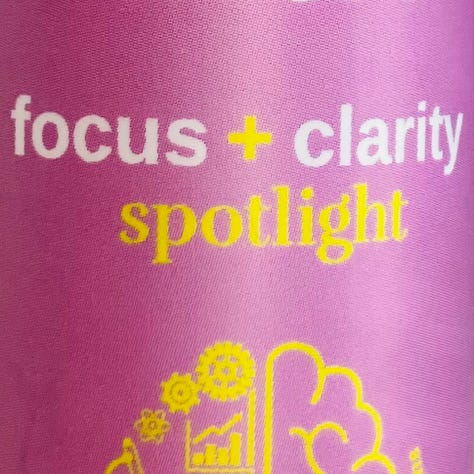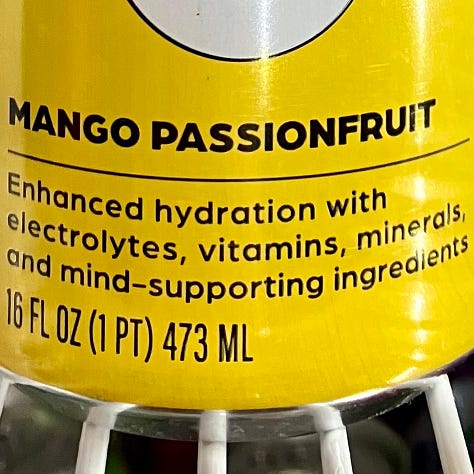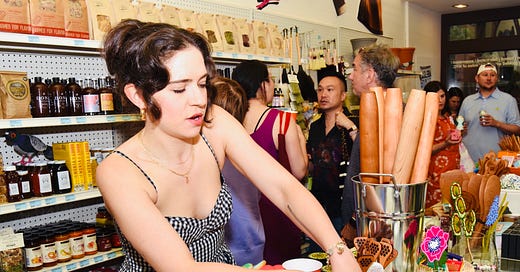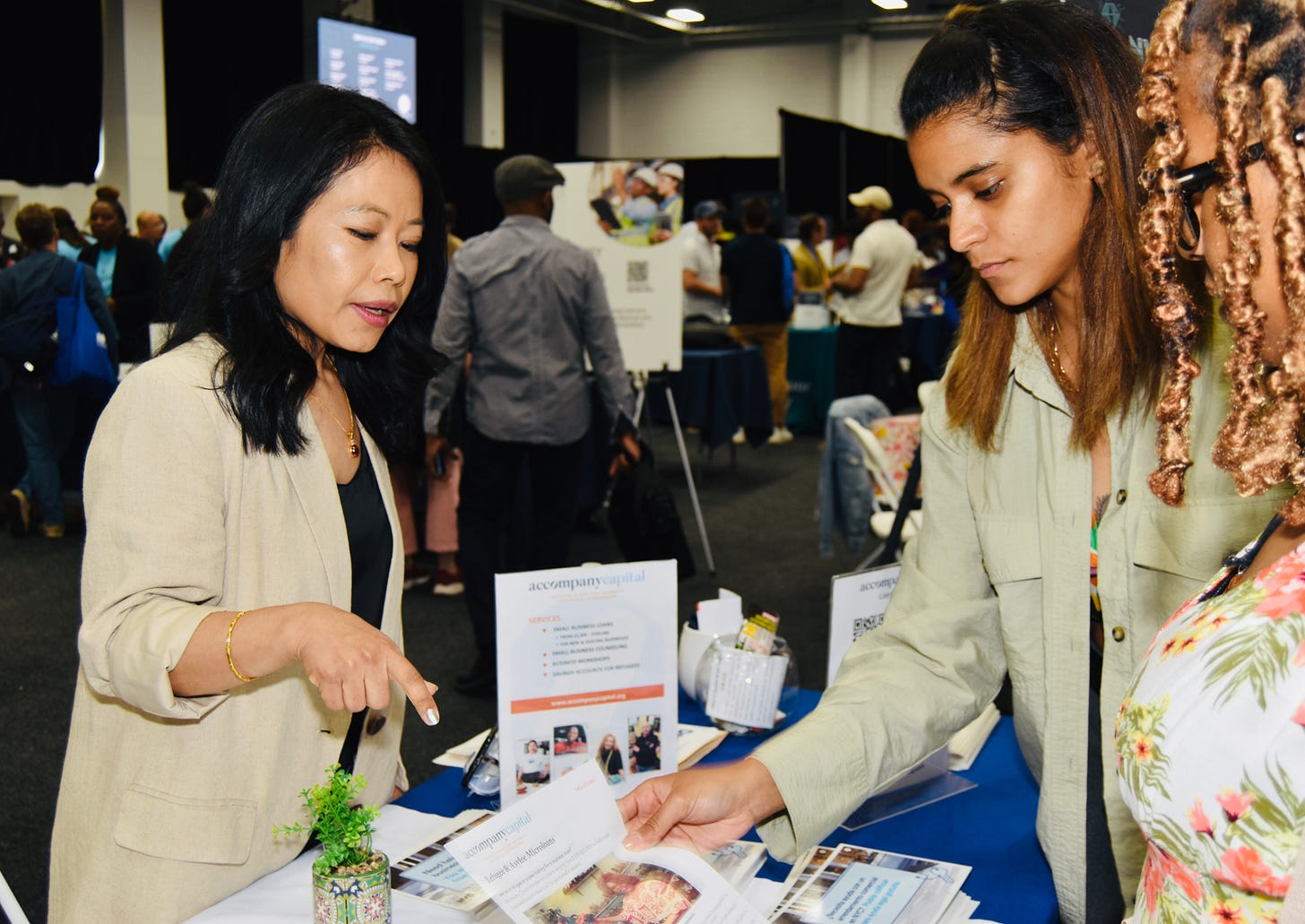NYC's Mercantile Mayhem: Shopping Local as it Should Be, CDFIs Part 1, Foxtrotting Out of The Ashes and What The "Functional" Drink?
A newsletter about the survival of independent businesses in New York City with a focus on immigrant-owned, storefront retail and CPG enterprises.
SHOPPING LOCAL AS IT SHOULD BE: CHARMING, NOT CHARITY
The Locavore Variety Store is officially open! In my March 28 edition of Mercantile Mayhem, there was a photo and brief writeup about Caroline Weaver, the former owner of CW Pencil Enterprise, who was in the process of opening a new shop in the West Village. The shop opened on June 15 and it specializes in goods made by manufacturers, artisans and everything in between within a 100 mile radius of New York City. (Weaver made a couple of 100 mile radius exceptions, like the nail clippers with a special patented compartment to catch clippings, manufactured in Troy, NY.)

The Locavore Variety Store is thoroughly charming and the antitheses of a “strings and things” shop, as my friend Sarah calls pointless shops, or filled with future landfill. Rather, it sells jarred sauces and condiments, gum, beverages, homewares, stationary, shampoo, cleaning products, all within a wide price range, some of which can be found on the printed store circulars. There is a pickle barrel so pickles can be purchased one at a time. There are whiffle bats and balls, seeds, brooms, books, beautiful cloth dinner napkins in rich colors and felt pigeons made by Mother Pigeon dot the space. The store’s tagline is “Purveyors of Local Good” and it’s part of the Locavore Guide’s larger mission, which is to remind customers that shopping small is fun, worthwhile and a treat, not just a good deed as some “shop local” campaigns can come across. Read more about the shop and see the goods in this Curbed article by Emma Orlow.
The Locavore Variety Store: 434 6th Ave just south of 10th Street, across the avenue from the gorgeous Jefferson Market Library.
MERCANTILE MAYHEM NEWSLETTER SPONSORSHIP
I usually put the sponsorship info at the very end of the newsletter, but I’m placing it here for reasons that have to do with numbers and my bank account. I am looking for two additional sponsors—individuals, businesses, organizations or foundations—who believe that the survival of small businesses is essential to New York City (and other cities, towns, rural areas I might add). Sponsors, like the extraordinary Accompany Capital get a footer banner in the newsletter, which is viewed by all sorts of brilliant people in various sectors. If you would like to know the newsletter rates (a month costs what a CEO might pay for one business lunch) and stats, please contact me: ninarobertsnyc@gmail.com and I’ll send you the details. Please feel free to forward this newsletter to others, especially that eccentric gazillionaire uncle who is a small business advocate.
Some of you have paid for subscriptions via Substack, thaaaaaaank you so much!
THE CDFI, AN EXPLAINER, PART 1: WHY AND HOW CDFIS EXIST
New York City had its first Small Business Month Expo on May 29 at Pier 36, I attended and was pleasantly surprised. It ran smoothly, there were snacks by Joey Bats Cafe and Balkan Bites, among other NYC based companies and I have a new stash of ballpoint pen merch.
A large section was devoted to numerous CDFIs (Community Development Financial Institutions) including Accompany Capital, this newsletter’s wonderful sponsor. (Thank you!) But, many people—even within the financial sector—do not know what a CDFI is, how one works or its purpose. In a nutshell, CDFIs exist to lend money and provide financial services to overlooked communities.
But we have to go back in time for context. It was not that long ago that women, minorities, immigrants, the poor, among other groups, could not get approved for a mortgage or small business loan. They might have been considered a financial risk, but in many cases it boiled down to racism and sexism. Everything is not peaches and cream today, but it’s far better than it was.
Ideas around democratizing access to capital and financial services had been brewing within progressive anti-poverty and social justice circles and solidified in the early 1990s. President Clinton made access to capital part of his 1992 campaign and one year later the CDFI Fund was created, which is now part of the U.S. Department of The Treasury.
The CDFI Fund serves individual CDFIs across the country, like Accompany Capital, which are traditionally nonprofit financial institutions and mission-driven. Accompany Capital’s mission is to primarily serve New York City’s immigrant and refugee communities, other CDFIs have different missions, perhaps focusing on a particular region or population like veterans. New York State currently has more than 80 CDFIs.

The creation of the CDFI Fund that allows CDFIs to exist was spearheaded by Clifford Rosenthal who has a long history of bringing financial services to low-income communities; he led the CDFI Coalition for more than two decades. Rosenthal wrote the book Democratizing Finance that chronicles the history of the CDFI movement, published in 2019. I was lucky enough to attend one of his book party event, see above photos.
In CDFI Part 2, I will write about obtaining financing from a CDFI vs a traditional bank.
FOXTROT REDUX
Yes, the rumors are true, Mike LaVitola, Foxtrot’s original founder is reopening several store locations, starting with Chicago. This might seem off topic for Mercantile Mayhem, because Foxtrot is based in Chicago, but the sudden closure of 33 stores in April has impacted many CPG businesses, there are scores of unpaid POs, and it could easily happen in New York City.

I will write more about Foxtrot later, but according to LaVitola, who I heard speak Tuesday morning at a Bonside and Jamestown event, he was not part of Foxtrot’s day to day business for more than a year. He learned about the sudden store closures when everyone else did. There are new investors, Further Point Enterprises and they are working with LaVitola.
I thought LaVitola would be adamantly anti-private equity, as many speculate Foxtrot’s rapid expansion and acquisition of Dom’s Kitchen was its downfall, but he wasn’t, it’s more about knowing what private equity is and isn’t, and what it offers a brick and mortar business vs ecommerce.
Neha Govindraj is the founder of Bonside and moderated the conversation that also included Anne Mahlum, a startup wizard. Govindraj’s Bonside offers unique financing specifically designed for brick and mortar retail.
BEVERAGES, WTF? AND THE “F” STANDS FOR “FUNCTIONAL”
“Functional beverages” is a category of drinks that are marketed to have benefits beyond simply quenching thirst and/or tasting good. A large portion of the functional beverage category is considered to be healthy—reduced sugars, made with pre- or probiotics, premium ingredients that range from ginseng to CBD—often having “wellness” verbiage on the packaging. Energy and sports drinks are also considered part of the functional beverage category, as is kombucha.
The functional beverage market is massive, worth $156 billion in 2022 and is slated to be worth $277 billion by 2033. I attended BevNet last week, a two day conference for those in the beverage industry and I was shocked by the number of emerging and established functional beverages available. (I am not the demographic for this type of beverage, I drink the basics: coffee, water, fresh juice—so bovine sourced collagen peptides in ice tea is not really my jam.)
The marketing copy on these beverages was jarring. Terms like “mental stamina”, “clarity and focus”, “natural energy” and “for a happy mind” are slapped on bottles and cans, hinting at all sorts of nirvana-adjacent moods and mental benefits. Exact ingredients are listed on each drink, which consumers can read, but there seems to be no regulation as to how functional beverages can hint at these supposed positive effects on the body, mind and spirit.






Are consumers in on the gag, do they think one beverage will give them clarity? Maybe it’s the “placebo effect” and a drink does give someone “mental stamina” if they think it will? Or is this a case of “there’s a sucker born every minute”? These drinks are not cheap. Of course, there is the possibility that I’m just a Gen X crank.
It’s so refreshing (pun intended) when a sparkling soda is marketed as a sparkling soda, perhaps highlighting ingredients or the company’s social mission if they have one. Despite my shock at this (new to me) beverage category, I thoroughly enjoyed BevNet, there were numerous industry speakers like Sahra Nguyen of the Nguyen Coffee Supply, one-on-one meetings with buyers from Whole Foods among other stores and beverage samples galore.
🎶 🎵 🎶 NA-NA-NA-NA-NA-NA-NA-NA-NA-NA-NA-NOMIN-A-TIONS! 🎶 🎵 🎶
Nominate two New York City entities in the near future: a Chinatown small business and urban design projects..
Nominations for Chinatown 2024 Small Business Award are open! Do you have a favorite restaurant, gift shop, salon, gallery, hardware, book or plant store in Chinatown? Chinatown is one of the last remaining neighborhoods downtown that has thriving independent small businesses and they should be celebrated. There are four categories: Hall of Fame, Bright Beginnings, Spirit of Chinatown and Fan Favorite. Each winner will receive a $5,000 grant from Welcome to Chinatown, nominations are open until June 30, click here for details.
Nominations are open for the MASterworks Design Awards, organized by the Municipal Art Society of New York (MAS). Nominated projects must “exemplify excellence in architecture and urban design”, be in New York City and completed in the previous year. The 7 categories include: Best New Building, Best Urban Landscape, Best Restoration, Best Adaptive Reuse, Best New Infrastructure, Best New Urban Amenity and Best Environmental Innovation. Projects can be nominated here until July 8.
Past MASterworks Design Awards that have had mercantile uses have gone to New Lab, Macro Sea, Empire Stores, the TKTS Booth and perhaps El Barrio Bait Station.
OPPORTUNITIES
1. NYU-Yale Summer Accelerator Pitchoff
July 26, 5pm to 7pm, there will be a pitch competition between six seed-stage startups, three from NYU and three from Yale. Panelists include: Chika Ogele of Newark Venture Partners, Justin Silver, founder of AAVRANI and Christine Hong, Investment Manager at Techstars. Event details here.
2. Free Cyber Security Webinar for Small Businesses
June 20, 2:30pm - 3:30pm. Jasleen Madaan, Vendor Risk Manager with DIME Bank, will present aspects of cybersecurity risk management to help protect small businesses from computer crimes. She’ll also discuss NYS cybersecurity regulation among other regulations. This event is presented by Accompany Capital, The Queens Chamber of Commerce and Dime Bank, click here to sign up.






I wish we had a Locavore Variety Store in the greater Boston area!
Informative and interesting newsletter as always.